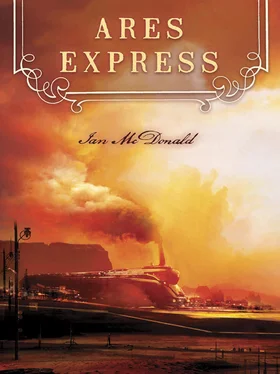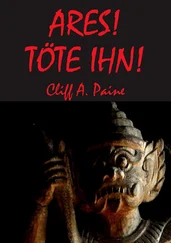She had woken with a shock, convinced that she was back in her mahogany cubby on the train, that Sweetness was a three-year-old again, banging on her door when her mother and father were sullenly arguing again. Her eyes told her no, you are on a bench in the Members Bar in Molesworth Rathaus ; her ears told her, through the distant shouting and sirens and gobble of burning, there is a riot outside. The dream had been so vivid, so insistent; the dark cloud and her granddaughter standing under it in a deserted stone square; with none of the skewed logic or narrative absurdities of dreamspeak. Meaning was not veiled in metaphor or subconscious sexual imagery. No trains entering tunnels, no umbrellas or daggers or pointy airships. This was classically structured, with a clear and precise message, if packed overdensely with important points and presented in Sweetness’s characteristic all-in-one-breath delivery. This was no dream. This was a sending. Grandparents believe in such things. She wrote down the gist of it on a napkin, studied it for a time while listening to the ebb and flow of riot outside, then slept again without further dream or sending.
“Sit ye down,” Weill invited, gesturing to a chair. “Well, I told you it would be funny.”
Grandmother Taal did not sit. She surveyed the ruined plaza. It was comment enough on Weill’s sense of humour. Then she said, quite formally, “I do not know who you are, but I know what you are capable of. I am asking you, please help me find my granddaughter. I fear she has become enmeshed in great danger, for herself, and for us all.”
She spread the napkin on the table. The newspapers all folded shut at once.
“I had a sending,” Grandmother Taal said.
Bladnoch read the napkin. Seskinore sat back with a faraway look in his eye, then pointed at Grandmother Taal and asked, “Last night, didn’t you say you were a Chordant Asiim Engineer? Is that any relation of the Chordants of Vermeulen? Maybe not, they weren’t actually trainfolk, but I am acquainted with many people from the trains. Do you know I used to work the South Rim Scenic Recreational?”
Bladnoch raised an eyebrow, passed the napkin to Skerry, whose pupils dilated after the first line.
“Marvellous people, marvellous. It was more of a cruise than a train trip: the very best you know, food and wine, and standards of service! And clientele too; the very cream, you had to be to be able to afford the South Rim Scenic; and though I say so myself, the entertainment, top of the line. And the views down over Grand Valley in the evening, quite wonderful.”
Skerry now passed the napkin to Mishcondereya, whose look of mounting impatience at Seskinore’s enthusiasm for bounding into showbiz reminiscence at any opportunity turned on an instant to concern.
“Wonderful little train; very select, you see. Wonderful bill: there was Jimmy and Alice, and Mr. Superb—whatever happened to him?—and Dimmy darling. Dear Dimmy—dead these three years, alas—but I suppose you wouldn’t know them; Engineer people don’t get back to the passengers too often, do they? Or maybe your branch of the family’s freight? That would be unfortunate, think what you’ve missed. Anyway, I got to know some of the Stuards; fine folk, if a little standoffish at first. That’s a thing you learn in my line, how to read people, then how to bring them round. If you can’t bring an audience round, you’re dead as a comic, dear, dead.”
“Seskinore,” Mishcondereya said, “as a comic, you were never alive.” She passed him the napkin. His mouth opened. His eyebrows steepled. He passed it to Weill, whose only response was a small smile lurking at the corners of his mouth.
“I think we can help you in this,” Skerry said, solemnly.
Half an hour later, Grandmother Taal was punching across Solstice Landing’s industrial scablands on a fast, executive express.
It was a low, fast, two-car unit with automated tilt mechanism designed to lean into the bends as the sleek, supercharged Great Southern Class 27 hauled it at speeds of up to five hundred kilometres per hour. Too small to have a resident Domiety, the engine was crewed by a newly wed team Grandmother Taal remembered from the lavishness of their wedding a few corroborees back. No kids yet. Nor likely to be; these priority service specials played fast and loose with the radiation shielding. Their privilege, their choice, but when she hailed them under the stone vault of Molesworth Main, they snubbed her. Bad word passed fast along the lines. The Asiim Engineers would be an age healing this social wound. For a moment Grandmother Taal contemplated invoking her full matronly authority; thought better. Molesworth and punk engineers did not deserve it. They whistled up and moved out on to the fast line.
The carriages were a symphony in cream leather, streamlined and smooth as infants’ buttocks. Clever machinery was concealed behind the curvaceous banks of hide; the leather was clever, too; a touch, a word and controls or information screens would appear like tattoos on the surface. The carpet was toe-deep fur pile, the raked windows tinted gold. All very sophisticated, high-tech, minimal yet with a whiff of decadence, utterly last century. This age favoured heavy wood and heavier metal: big brass clunking stuff. The Synod in Wisdom, which had little experience of and less budget for running a counterinsurgency force, had bought it cut price off a Lyxian broker who had bankrupted five generations of family fortune on speculation in mink futures. Now it ferried United Artists at speed and in fin du siècle luxury around the planet on missions of political practical joking.
“An old trainmother tells you something from a dream, and you believe the end of the world is nigh?” Grandmother Taal asked as the train took points at three hundred and eighty on to the westbound fast and powered up.
“We’re supposed to work eclectically,” Skerry said, fidgeting on a curving leather sofa. She was never comfortable sitting down for long. Weill had told Grandmother Taal she could put both legs behind her neck. I wish I could do that , thought Grandmother Taal, then realised she had a better chance now than for a long time. Bladnoch, curled at the other end of the couch, was the opposite; never happier than when horizontal. He surreptitiously watched the afternoon pelota on a televisual patch of armrest. Backstage in the comedy clubs, the whisper was, Bladnoch, he could have been the greatest, ’cept for that addiction to televised sport .
“She means, we don’t just take the word of sweet old ladies, no matter how good their juju is,” said Mishcondereya, glowing and scrubbed from a showering off all that nasty Molesworth grit. She towelled at her hair furiously, began the laborious task of reinserting all her jewellery.
“You see, my dear, your story about the hole in the middle of the line rang true, because it’s very far from being the first,” Seskinore said, pouring Grandmother Taal a glass of mint tea. He dropped in a sugar cube, pounded it with a glass rod, gave it three swirls. “My own trade secret. On the circuit, you learn the art of good tea.” It tasted no better than most others, worse certainly than Marya Stuard’s. He continued, “Bloody things’ve been popping up all over the place. Chryse, Tempe, Axidy. Even Grand Valley. Could be hundreds of the things out in the desert we never hear about. Little breakdowns in reality. Some of those orbital processors have been running constantly for well over a thousand years, so they’re bound to be showing the strain, and of course they skimp on the maintenance budget. Perfect opportunity for our friend up there to sneak in the back way.”
“Apart from that, we’ve been keeping an eye on Devastation Harx and his crew,” Weill said, feet up on a padded mound that served as a tea-table. “We keep an eye on most of the apocalyptic religions.”
Читать дальше












